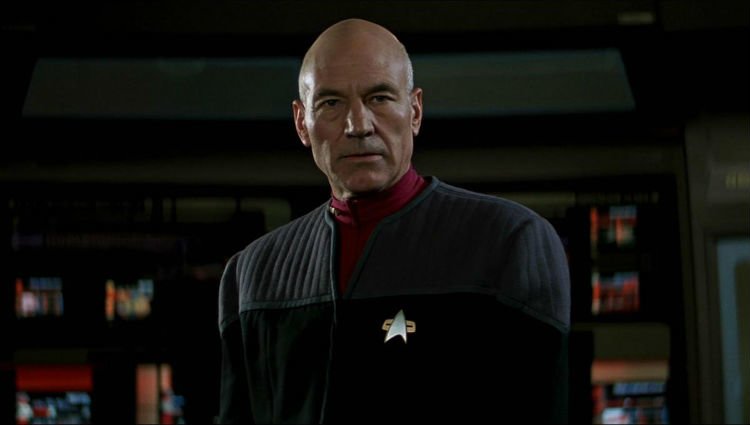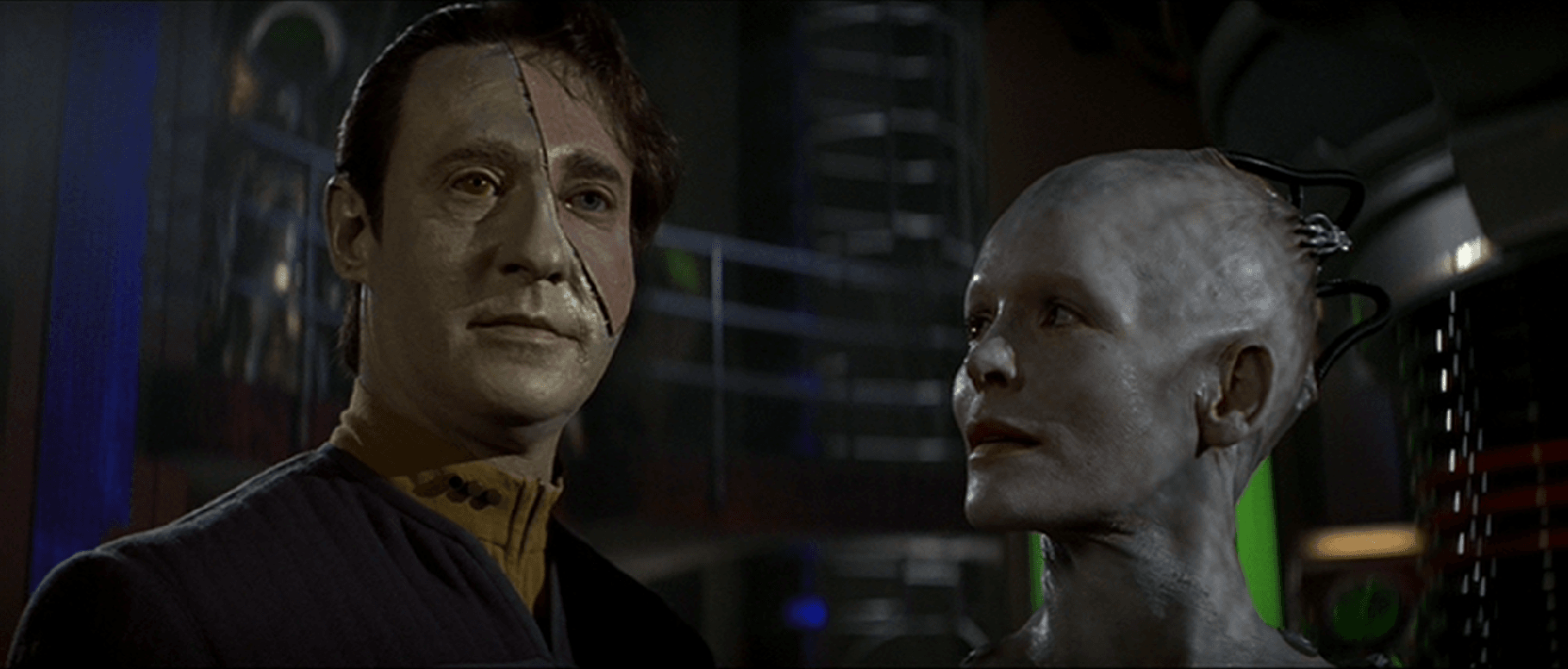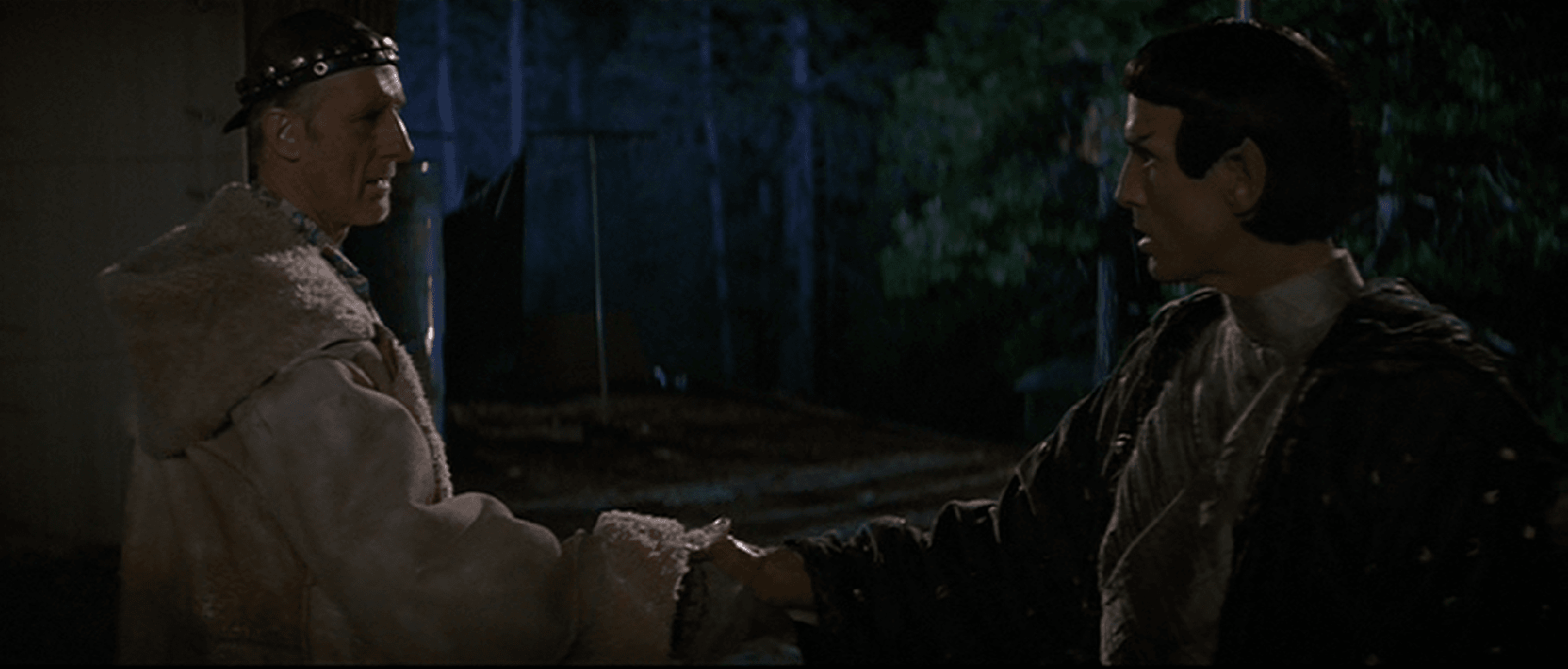
Moving on to the cast, this may well be Sir Patrick Stewart’s finest hour (well, two hours) as Picard. This is not, generally speaking, a character who is comfortable with expressing vulnerability. Rather, he’s a private person who often errs on the side of putting up a stoic façade (indeed, no less an expert than Spock once described him as possessing “an almost Vulcan quality”). Where the Borg are concerned, though, that all goes right out the airlock. You can see this in ‘Family‘, though it manifests a bit differently. In that episode, the trauma of his assimilation is still a fresh wound, and though Picard tries – as is his wont – to maintain his composure, that dam eventually bursts in a powerful moment of catharsis. Here though? Now he’s been living with that trauma for six years, and the ways in which that affects his actions and his judgment are on full display.
Put simply? More so than ever before, Jean-Luc Picard is a man on the edge. It’s written on his face as they listen to transmissions from the battle before warping to Earth. It’s in his mercy killing of a crewman, his blind rage and loss of control on the holodeck. We see it as his determination to defeat the Borg turns into near-suicidal pigheadedness. And of course, ‘First Contact’ has it’s own crowning catharsis, as Picard breaks his “little ships.” But in ‘Family’ that catharsis is the end of the story. Here, it’s a turning point. It’s the moment at which he comes to his senses, leading him to resolve to rescue Data and confront his demons – the Borg and their Queen – once and for all. And of course, we see all of this in his final moment of closure as he snaps the Queen’s “neck”.

There is, however, a downside to all the fantastic character work that the film does with Picard. And that’s that the rest of the cast doesn’t get nearly as much to work with. To be sure, everyone gets at least a moment (Troi’s drunken rant about the timeline and LaForge telling Cochrane about his future statue come immediately to mind), but aside from Picard, the only character who gets a significant arc is Data. And even he disappears for most of the second act. But while the bulk of the ensemble may not have gotten as much time in the spotlight as I might have liked, sometimes a small role is all you need. That’s certainly the case with the familiar faces we see from the series’ extended guest cast, namely Lieutenant Barclay and Nurse Ogawa (in her final appearance). Sure, they’re basically just cameos, but it’s still more than you’d normally expect from one of these movies, particularly one as focused on a single character’s arc as ‘First Contact’.
The guest cast, though, is outstanding. Alice Krige is unforgettable as the Borg Queen, and while Susanna Thompson will briefly assume the role on ‘Voyager’ (where she’ll do a fine job of it), Krige’s return in that show’s finale demonstrates that there’s just no topping the original. While the Queen is a mixed bag conceptually – one the one hand, contributing to the erosion of what made the Borg scary in ‘Q Who, but on the other providing a much needed dramatic focal point (as opposed to the more diffuse antagonist that the Borg more generally would have provided) – there’s nothing to complain about in what Krige does with the role, particularly her chemistry with Data and (more briefly) Picard.
Likewise, Alfre Woodard is a remarkable presence as Lily Sloan. As the only non-Starfleet officer in this situation (as a survivor of World War III, no less), she’s able to provide a perspective – and when necessary cross line – that the main cast either can’t or won’t. This reaches its peak when she marches into the observation lounge to call Picard on his (in her words) bullshit. It’s a pivotal, explosive seen that includes some of the film’s most memorable moments. Imagine getting those pages and realizing that you’ll have to act that material opposite Sir Patrick Stewart. And then imagine doing it this well!

And that, finally, brings us to Zefram Cochrane, as played by James Cromwell. When he first appeared in ‘Metamorphosis’, Cochrane was not exactly the most memorable guest star that the original series had to offer. Here, however? Cromwell’s version of the character is, like most of us, complicated. He drinks, and his work on the Phoenix was by his own admission motivated by personal gain, and there are even hints at a lecherous side of the man. Indeed, there’s no small measure of dramatic irony in the fact that the man seen as most directly responsible for bringing about the ‘Star Trek’ utopia should probe to be such a deeply flawed (albeit essentially decent) person. And if it sounds like I could just as easily be talking about Gene Roddenberry? Well, I don’t know it for a fact, but let’s just say I’d be surprised if the similarity was entirely accidental. But nonetheless, we see Cochrane subtly grow through his interactions with the crew – Riker in particular. And in the film’s closing moments, we see the first glimmers of “Zefram Cochrane: Historical Figure.” Not bad for someone we first saw as he was being dragged out of a bar.
In that sense, I suppose Cochrane could be taken as representative of the view ‘Star Trek’ has always held of humanity as a whole: flawed, but capable of great things nonetheless.
Well… I think that’s a new record for the length of this column. Since I’m now exhausted and out of words, what do you think? Where do you rate ‘First Contact’ in the pantheon of ‘Star Trek’ movies? Let me know in the comments, and be sure to check back in two weeks, by which time I will hopefully have reacquainted myself with the soul of wit.
